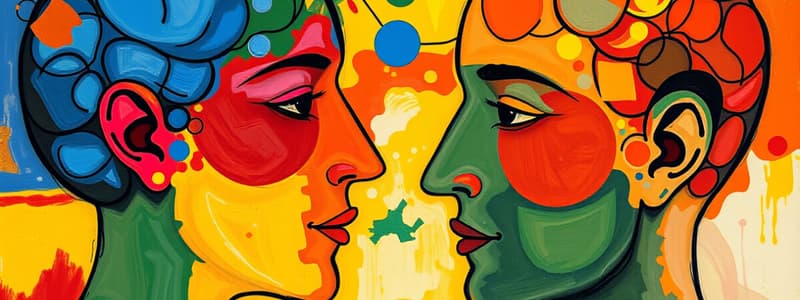Podcast
Questions and Answers
What characteristic is associated with the melancholic temperament?
What characteristic is associated with the melancholic temperament?
- Consistently optimistic and cheerful
- Highly impulsive and bold
- Perfectionist with introspective traits (correct)
- Strongly sociable and outgoing
Which of the following traits best describes the phlegmatic temperament?
Which of the following traits best describes the phlegmatic temperament?
- Emotionally expressive and passionate
- Calm, easy-going, and reliable (correct)
- Energetic and frequently engaged
- Quick to make decisions and assertive
What is a common weakness of the sanguine temperament?
What is a common weakness of the sanguine temperament?
- Tendency to be overly pessimistic
- Strong self-discipline and focus
- Restlessness and disorganization (correct)
- Highly organized and disciplined
Which temperament is generally considered to be hot-tempered and impulsive?
Which temperament is generally considered to be hot-tempered and impulsive?
Which of the following characteristics does NOT describe the choleric temperament?
Which of the following characteristics does NOT describe the choleric temperament?
Which temperament type is characterized as hot-tempered and irritable due to rapid and intense reactions to impressions?
Which temperament type is characterized as hot-tempered and irritable due to rapid and intense reactions to impressions?
What fundamental disposition does Hippocrates believe influences the temperament of a person?
What fundamental disposition does Hippocrates believe influences the temperament of a person?
In which temperament type does the individual experience minimal excitement from impressions but retains those impressions deeply?
In which temperament type does the individual experience minimal excitement from impressions but retains those impressions deeply?
Which of the following temperament types is described as cheerful and hopeful, reacting quickly but with impressions that fade away?
Which of the following temperament types is described as cheerful and hopeful, reacting quickly but with impressions that fade away?
According to Hippocrates, what humor is associated with the sanguine temperament?
According to Hippocrates, what humor is associated with the sanguine temperament?
Which temperament is characterized by being calm and stable, potentially analyzing situations before reacting?
Which temperament is characterized by being calm and stable, potentially analyzing situations before reacting?
How is character fundamentally different from temperament?
How is character fundamentally different from temperament?
Which of the following characteristics would most likely belong to a person classified as cyclothymic?
Which of the following characteristics would most likely belong to a person classified as cyclothymic?
What distinguishes abilities from skills according to the content provided?
What distinguishes abilities from skills according to the content provided?
According to the types of characters distinguished, which type is associated with a predisposition to manic-depressive psychosis?
According to the types of characters distinguished, which type is associated with a predisposition to manic-depressive psychosis?
The sanguine temperament is characterized by being cheerful and stable due to quick but fleeting reactions to impressions.
The sanguine temperament is characterized by being cheerful and stable due to quick but fleeting reactions to impressions.
Choleric individuals are marked by their calmness and an ability to analyze situations before reacting.
Choleric individuals are marked by their calmness and an ability to analyze situations before reacting.
Hippocrates associated the melancholic temperament with bitterness from the kidneys.
Hippocrates associated the melancholic temperament with bitterness from the kidneys.
The phlegmatic temperament is recognized for its quick and intense reactions to external stimuli.
The phlegmatic temperament is recognized for its quick and intense reactions to external stimuli.
The choleric temperament is responsible for strong emotional sensitivity, such as tenderness.
The choleric temperament is responsible for strong emotional sensitivity, such as tenderness.
Match the following temperament types with their key characteristics:
Match the following temperament types with their key characteristics:
Match the following humor types associated with temperaments to their corresponding temperament:
Match the following humor types associated with temperaments to their corresponding temperament:
Match the following traits with the correct temperament they are often associated with:
Match the following traits with the correct temperament they are often associated with:
Match the following descriptions with the right temperament:
Match the following descriptions with the right temperament:
Match the following key terms with their definitions:
Match the following key terms with their definitions:
Study Notes
Mental Properties and Personality Traits
- Mental properties regulate personality traits and are established gradually through reflection and practice.
- Personality traits are diverse, including intellectual (observation, mental flexibility), strong-willed (decisiveness, perseverance), and emotional (tenderness, sensitivity).
Hippocrates and Temperament Theory
- Hippocrates introduced temperament theory based on biological characteristics of innate personality traits.
- Four temperaments identified: sanguine (blood), choleric (bile), melancholic (bitterness), phlegmatic (phlegm).
- Each temperament has distinct reactions and behavioral tendencies:
- Choleric: Hot-tempered, immediately excited, extroverted, unstable.
- Sanguine: Cheerful, optimistic, excited but fleeting responses, extroverted, stable.
- Melancholic: Sensitive, responds slowly but deeply, introverted, unstable.
- Phlegmatic: Calm, slow to react, introverted, stable.
Strengths and Weaknesses of Each Temperament
-
Sanguine:
- Strengths: Enjoys life, optimistic, friendly, compassionate, extroverted.
- Weaknesses: Restless, weak-willed, egotistical, emotionally unstable.
-
Choleric:
- Strengths: Strong-willed, practical, natural leader, optimistic, extroverted.
- Weaknesses: Impulsive, cruel, self-sufficient, hot-tempered.
-
Melancholic:
- Strengths: Sensitive, perfectionist, loyal, self-sacrificing, introverted.
- Weaknesses: Self-centered, pessimistic, moody.
-
Phlegmatic:
- Strengths: Easygoing, witty, dependable, practical, neat.
- Weaknesses: Slow, lazy, stubborn, indecisive.
Responses to Situations
- Different temperaments respond distinctively when faced with similar situations:
- Choleric: impulsively dissatisfied.
- Phlegmatic: calm and analyzing.
- Melancholic: sensitively expressive.
- Sanguine: humorously addressing.
Relationship Between Temperament and Anger
- Temperaments predispose individuals to different emotional responses, with Sanguine and Choleric leaning towards anger, while Phlegmatic generally avoids it.
- Introverted individuals (Melancholic, Phlegmatic) may struggle more with fear, whereas extroverted ones (Choleric, Sanguine) may face anger.
Character Traits
- Character consists of acquired traits that can evolve and is stable throughout a person's life.
- Character is shaped by attitudes towards reality, work, and self:
- Attitude towards others (honesty, sincerity).
- Attitude towards work (hard work, prudence).
- Attitude towards self (self-esteem, egocentrism).
Types of Character According to Kretschmer
- Asthenic: Thin, prone to anxiety.
- Athletic: Strongly built, confident.
- Picnic: Round, often sociable but may fall to emotional extremes.
Abilities and Skills
- Abilities: innate traits enabling successful activities; encompass mental processes and facilitate quick learning and application.
- Skills: learned behaviors developed through training or experience; easily measurable and teachable.
Summary of Key Concepts
- Temperament: Innate traits affecting behavior based on genetic heritage.
- Character: Acquired traits shaped by life experiences and upbringing.
- Personality: Combination of both inborn and acquired traits influencing overall behavior.
Mental Properties and Personality Traits
- Mental properties regulate personality traits and are established gradually through reflection and practice.
- Personality traits are diverse, including intellectual (observation, mental flexibility), strong-willed (decisiveness, perseverance), and emotional (tenderness, sensitivity).
Hippocrates and Temperament Theory
- Hippocrates introduced temperament theory based on biological characteristics of innate personality traits.
- Four temperaments identified: sanguine (blood), choleric (bile), melancholic (bitterness), phlegmatic (phlegm).
- Each temperament has distinct reactions and behavioral tendencies:
- Choleric: Hot-tempered, immediately excited, extroverted, unstable.
- Sanguine: Cheerful, optimistic, excited but fleeting responses, extroverted, stable.
- Melancholic: Sensitive, responds slowly but deeply, introverted, unstable.
- Phlegmatic: Calm, slow to react, introverted, stable.
Strengths and Weaknesses of Each Temperament
-
Sanguine:
- Strengths: Enjoys life, optimistic, friendly, compassionate, extroverted.
- Weaknesses: Restless, weak-willed, egotistical, emotionally unstable.
-
Choleric:
- Strengths: Strong-willed, practical, natural leader, optimistic, extroverted.
- Weaknesses: Impulsive, cruel, self-sufficient, hot-tempered.
-
Melancholic:
- Strengths: Sensitive, perfectionist, loyal, self-sacrificing, introverted.
- Weaknesses: Self-centered, pessimistic, moody.
-
Phlegmatic:
- Strengths: Easygoing, witty, dependable, practical, neat.
- Weaknesses: Slow, lazy, stubborn, indecisive.
Responses to Situations
- Different temperaments respond distinctively when faced with similar situations:
- Choleric: impulsively dissatisfied.
- Phlegmatic: calm and analyzing.
- Melancholic: sensitively expressive.
- Sanguine: humorously addressing.
Relationship Between Temperament and Anger
- Temperaments predispose individuals to different emotional responses, with Sanguine and Choleric leaning towards anger, while Phlegmatic generally avoids it.
- Introverted individuals (Melancholic, Phlegmatic) may struggle more with fear, whereas extroverted ones (Choleric, Sanguine) may face anger.
Character Traits
- Character consists of acquired traits that can evolve and is stable throughout a person's life.
- Character is shaped by attitudes towards reality, work, and self:
- Attitude towards others (honesty, sincerity).
- Attitude towards work (hard work, prudence).
- Attitude towards self (self-esteem, egocentrism).
Types of Character According to Kretschmer
- Asthenic: Thin, prone to anxiety.
- Athletic: Strongly built, confident.
- Picnic: Round, often sociable but may fall to emotional extremes.
Abilities and Skills
- Abilities: innate traits enabling successful activities; encompass mental processes and facilitate quick learning and application.
- Skills: learned behaviors developed through training or experience; easily measurable and teachable.
Summary of Key Concepts
- Temperament: Innate traits affecting behavior based on genetic heritage.
- Character: Acquired traits shaped by life experiences and upbringing.
- Personality: Combination of both inborn and acquired traits influencing overall behavior.
Mental Properties and Personality Traits
- Mental properties regulate personality traits and are established gradually through reflection and practice.
- Personality traits are diverse, including intellectual (observation, mental flexibility), strong-willed (decisiveness, perseverance), and emotional (tenderness, sensitivity).
Hippocrates and Temperament Theory
- Hippocrates introduced temperament theory based on biological characteristics of innate personality traits.
- Four temperaments identified: sanguine (blood), choleric (bile), melancholic (bitterness), phlegmatic (phlegm).
- Each temperament has distinct reactions and behavioral tendencies:
- Choleric: Hot-tempered, immediately excited, extroverted, unstable.
- Sanguine: Cheerful, optimistic, excited but fleeting responses, extroverted, stable.
- Melancholic: Sensitive, responds slowly but deeply, introverted, unstable.
- Phlegmatic: Calm, slow to react, introverted, stable.
Strengths and Weaknesses of Each Temperament
-
Sanguine:
- Strengths: Enjoys life, optimistic, friendly, compassionate, extroverted.
- Weaknesses: Restless, weak-willed, egotistical, emotionally unstable.
-
Choleric:
- Strengths: Strong-willed, practical, natural leader, optimistic, extroverted.
- Weaknesses: Impulsive, cruel, self-sufficient, hot-tempered.
-
Melancholic:
- Strengths: Sensitive, perfectionist, loyal, self-sacrificing, introverted.
- Weaknesses: Self-centered, pessimistic, moody.
-
Phlegmatic:
- Strengths: Easygoing, witty, dependable, practical, neat.
- Weaknesses: Slow, lazy, stubborn, indecisive.
Responses to Situations
- Different temperaments respond distinctively when faced with similar situations:
- Choleric: impulsively dissatisfied.
- Phlegmatic: calm and analyzing.
- Melancholic: sensitively expressive.
- Sanguine: humorously addressing.
Relationship Between Temperament and Anger
- Temperaments predispose individuals to different emotional responses, with Sanguine and Choleric leaning towards anger, while Phlegmatic generally avoids it.
- Introverted individuals (Melancholic, Phlegmatic) may struggle more with fear, whereas extroverted ones (Choleric, Sanguine) may face anger.
Character Traits
- Character consists of acquired traits that can evolve and is stable throughout a person's life.
- Character is shaped by attitudes towards reality, work, and self:
- Attitude towards others (honesty, sincerity).
- Attitude towards work (hard work, prudence).
- Attitude towards self (self-esteem, egocentrism).
Types of Character According to Kretschmer
- Asthenic: Thin, prone to anxiety.
- Athletic: Strongly built, confident.
- Picnic: Round, often sociable but may fall to emotional extremes.
Abilities and Skills
- Abilities: innate traits enabling successful activities; encompass mental processes and facilitate quick learning and application.
- Skills: learned behaviors developed through training or experience; easily measurable and teachable.
Summary of Key Concepts
- Temperament: Innate traits affecting behavior based on genetic heritage.
- Character: Acquired traits shaped by life experiences and upbringing.
- Personality: Combination of both inborn and acquired traits influencing overall behavior.
Studying That Suits You
Use AI to generate personalized quizzes and flashcards to suit your learning preferences.
Description
Explore the connection between mental properties and personality traits in this quiz. Learn about Hippocrates' four temperaments and how they influence behavioral tendencies. Test your knowledge on the characteristics of choleric, sanguine, melancholic, and phlegmatic personalities.





